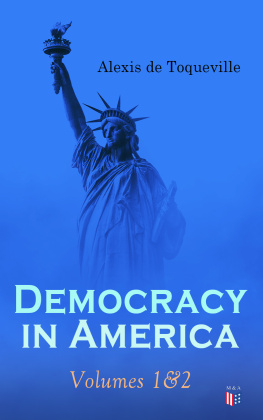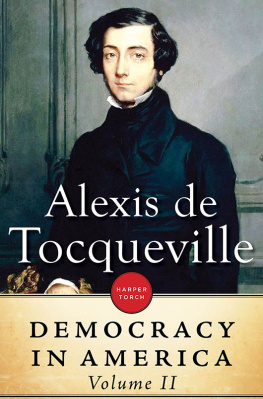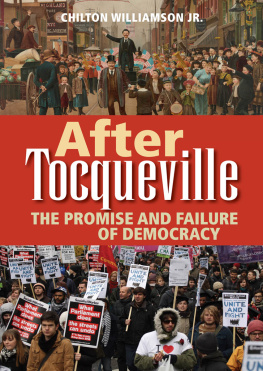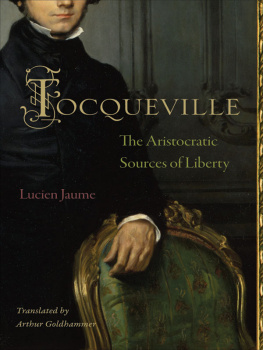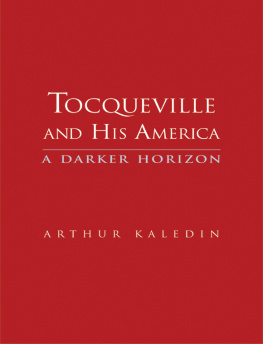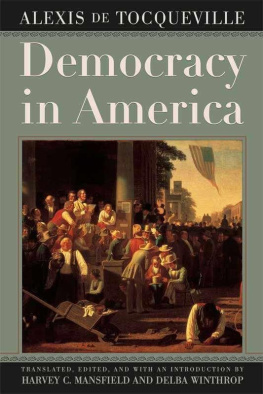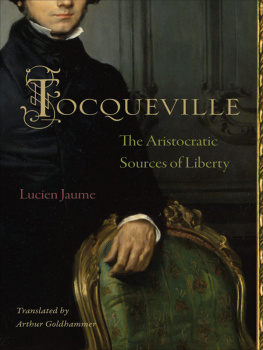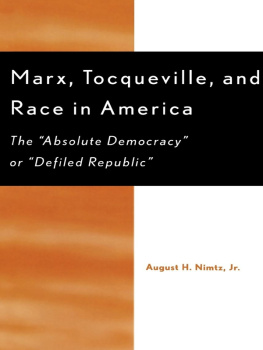Tocqueville Alexandre de - Democracy in America
Here you can read online Tocqueville Alexandre de - Democracy in America full text of the book (entire story) in english for free. Download pdf and epub, get meaning, cover and reviews about this ebook. genre: Science. Description of the work, (preface) as well as reviews are available. Best literature library LitArk.com created for fans of good reading and offers a wide selection of genres:
Romance novel
Science fiction
Adventure
Detective
Science
History
Home and family
Prose
Art
Politics
Computer
Non-fiction
Religion
Business
Children
Humor
Choose a favorite category and find really read worthwhile books. Enjoy immersion in the world of imagination, feel the emotions of the characters or learn something new for yourself, make an fascinating discovery.
- Book:Democracy in America
- Author:
- Genre:
- Rating:3 / 5
- Favourites:Add to favourites
- Your mark:
- 60
- 1
- 2
- 3
- 4
- 5
Democracy in America: summary, description and annotation
We offer to read an annotation, description, summary or preface (depends on what the author of the book "Democracy in America" wrote himself). If you haven't found the necessary information about the book — write in the comments, we will try to find it.
Democracy in America — read online for free the complete book (whole text) full work
Below is the text of the book, divided by pages. System saving the place of the last page read, allows you to conveniently read the book "Democracy in America" online for free, without having to search again every time where you left off. Put a bookmark, and you can go to the page where you finished reading at any time.
Font size:
Interval:
Bookmark:
The Project Gutenberg EBook of Democracy In America, Volume 1 (of 2), by
Alexis de Toqueville
This eBook is for the use of anyone anywhere at no cost and with
almost no restrictions whatsoever. You may copy it, give it away or
re-use it under the terms of the Project Gutenberg License included
with this eBook or online at www.gutenberg.org
Title: Democracy In America, Volume 1 (of 2)
Author: Alexis de Toqueville
Translator: Henry Reeve
Release Date: January 21, 2006 [EBook #815]
Language: English
*** START OF THIS PROJECT GUTENBERG EBOOK DEMOCRACY IN AMERICA, V1 ***
Produced by David Reed and David Widger
Book One Introduction Hon. John T. Morgan Introductory Chapter Chapter I: Exterior Form Of North America Chapter Summary Chapter II: Origin Of The Anglo-AmericansPart I Chapter Summary Chapter II: Origin Of The Anglo-AmericansPart II Chapter III: Social Conditions Of The Anglo-Americans Chapter Summary Chapter IV: The Principle Of The Sovereignty Of The People In America Chapter Summary Chapter V: Necessity Of Examining The Condition Of The StatesPart I Chapter V: Necessity Of Examining The Condition Of The StatesPart II Chapter V: Necessity Of Examining The Condition Of The StatesPart III Chapter VI: Judicial Power In The United States Chapter Summary Chapter VII: Political Jurisdiction In The United States Chapter Summary Chapter VIII: The Federal ConstitutionPart I Chapter Summary Summary Of The Federal Constitution Chapter VIII: The Federal ConstitutionPart II Chapter VIII: The Federal ConstitutionPart III Chapter VIII: The Federal ConstitutionPart IV Chapter VIII: The Federal ConstitutionPart V Chapter IX: Why The People May Strictly Be Said To Govern In The United Chapter X: Parties In The United States Chapter Summary Parties In The United States Chapter XI: Liberty Of The Press In The United States Chapter Summary Chapter XII: Political Associations In The United States Chapter Summary Chapter XIII: Government Of The Democracy In AmericaPart I Chapter XIII: Government Of The Democracy In AmericaPart II Chapter XIII: Government Of The Democracy In AmericaPart III Chapter XIV: Advantages American Society Derive From DemocracyPart I Chapter XIV: Advantages American Society Derive From DemocracyPart II Chapter XV: Unlimited Power Of Majority, And Its ConsequencesPart I Chapter Summary Chapter XV: Unlimited Power Of Majority, And Its ConsequencesPart II Chapter XVI: Causes Mitigating Tyranny In The United StatesPart I Chapter Summary Chapter XVI: Causes Mitigating Tyranny In The United StatesPart II Chapter XVII: Principal Causes Maintaining The Democratic RepublicPart I Chapter XVII: Principal Causes Maintaining The Democratic RepublicPart II Chapter XVII: Principal Causes Maintaining The Democratic RepublicPart III Chapter XVII: Principal Causes Maintaining The Democratic RepublicPart IV Chapter XVIII: Future Condition Of Three Races In The United StatesPart I Chapter XVIII: Future Condition Of Three RacesPart II Chapter XVIII: Future Condition Of Three RacesPart III Chapter XVIII: Future Condition Of Three RacesPart IV Chapter XVIII: Future Condition Of Three RacesPart V Chapter XVIII: Future Condition Of Three RacesPart VI Chapter XVIII: Future Condition Of Three RacesPart VII Chapter XVIII: Future Condition Of Three RacesPart VIII Chapter XVIII: Future Condition Of Three RacesPart IX Chapter XVIII: Future Condition Of Three RacesPart X Conclusion |
In the eleven years that separated the Declaration of the Independence of the United States from the completion of that act in the ordination of our written Constitution, the great minds of America were bent upon the study of the principles of government that were essential to the preservation of the liberties which had been won at great cost and with heroic labors and sacrifices. Their studies were conducted in view of the imperfections that experience had developed in the government of the Confederation, and they were, therefore, practical and thorough.
When the Constitution was thus perfected and established, a new form of government was created, but it was neither speculative nor experimental as to the principles on which it was based. If they were true principles, as they were, the government founded upon them was destined to a life and an influence that would continue while the liberties it was intended to preserve should be valued by the human family. Those liberties had been wrung from reluctant monarchs in many contests, in many countries, and were grouped into creeds and established in ordinances sealed with blood, in many great struggles of the people. They were not new to the people. They were consecrated theories, but no government had been previously established for the great purpose of their preservation and enforcement. That which was experimental in our plan of government was the question whether democratic rule could be so organized and conducted that it would not degenerate into license and result in the tyranny of absolutism, without saving to the people the power so often found necessary of repressing or destroying their enemy, when he was found in the person of a single despot.
When, in 1831, Alexis de Tocqueville came to study Democracy in America, the trial of nearly a half-century of the working of our system had been made, and it had been proved, by many crucial tests, to be a government of "liberty regulated by law," with such results in the development of strength, in population, wealth, and military and commercial power, as no age had ever witnessed.
[See Alexis De Tocqueville]
De Tocqueville had a special inquiry to prosecute, in his visit to America, in which his generous and faithful soul and the powers of his great intellect were engaged in the patriotic effort to secure to the people of France the blessings that Democracy in America had ordained and established throughout nearly the entire Western Hemisphere. He had read the story of the French Revolution, much of which had been recently written in the blood of men and women of great distinction who were his progenitors; and had witnessed the agitations and terrors of the Restoration and of the Second Republic, fruitful in crime and sacrifice, and barren of any good to mankind.
He had just witnessed the spread of republican government through all the vast continental possessions of Spain in America, and the loss of her great colonies. He had seen that these revolutions were accomplished almost without the shedding of blood, and he was filled with anxiety to learn the causes that had placed republican government, in France, in such contrast with Democracy in America.
De Tocqueville was scarcely thirty years old when he began his studies of Democracy in America. It was a bold effort for one who had no special training in government, or in the study of political economy, but he had the example of Lafayette in establishing the military foundation of these liberties, and of Washington, Jefferson, Madison, and Hamilton, all of whom were young men, in building upon the Independence of the United States that wisest and best plan of general government that was ever devised for a free people.
He found that the American people, through their chosen representatives who were instructed by their wisdom and experience and were supported by their virtuescultivated, purified and ennobled by self-reliance and the love of Godhad matured, in the excellent wisdom of their counsels, a new plan of government, which embraced every security for their liberties and equal rights and privileges to all in the pursuit of happiness. He came as an honest and impartial student and his great commentary, like those of Paul, was written for the benefit of all nations and people and in vindication of truths that will stand for their deliverance from monarchical rule, while time shall last.
Font size:
Interval:
Bookmark:
Similar books «Democracy in America»
Look at similar books to Democracy in America. We have selected literature similar in name and meaning in the hope of providing readers with more options to find new, interesting, not yet read works.
Discussion, reviews of the book Democracy in America and just readers' own opinions. Leave your comments, write what you think about the work, its meaning or the main characters. Specify what exactly you liked and what you didn't like, and why you think so.



